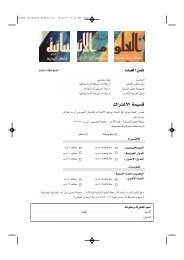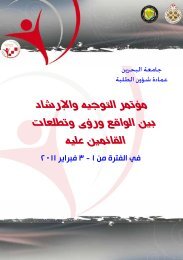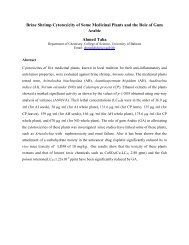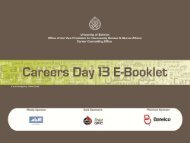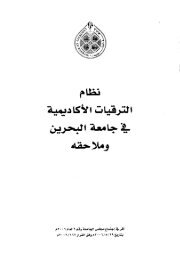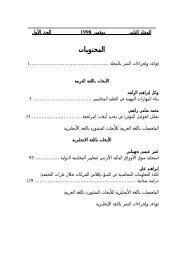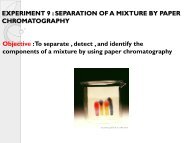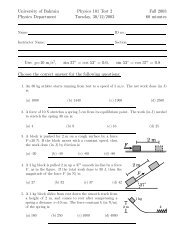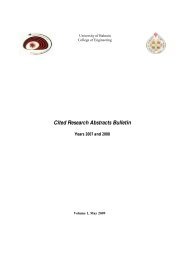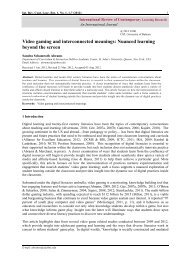د. ÙÙا بÙت عÙ٠اÙÙعÙ٠٠د. ÙÙÙÙÙÙÙÙادر ÙاظÙÙÙÙÙÙÙÙ٠د. ج٠ا٠... - جا٠عة اÙبØرÙÙ
د. ÙÙا بÙت عÙ٠اÙÙعÙ٠٠د. ÙÙÙÙÙÙÙÙادر ÙاظÙÙÙÙÙÙÙÙ٠د. ج٠ا٠... - جا٠عة اÙبØرÙÙ
د. ÙÙا بÙت عÙ٠اÙÙعÙ٠٠د. ÙÙÙÙÙÙÙÙادر ÙاظÙÙÙÙÙÙÙÙ٠د. ج٠ا٠... - جا٠عة اÙبØرÙÙ
Create successful ePaper yourself
Turn your PDF publications into a flip-book with our unique Google optimized e-Paper software.
2 0 1 1<br />
194<br />
entities in society), Badiou asked the question:<br />
“What are the conditions for a universal<br />
singularity?” (13) For a start, the truth as<br />
a universal singularity has to be entirely<br />
subjective. A person has to embrace it on a<br />
purely subjective basis without intermediary<br />
or mediation. Consequently, this truth, and<br />
it’s believing subject, have to pay the price<br />
of breaking up with established rites and<br />
markings specific to the subject’s locality<br />
before being reconstituted by that universal<br />
truth. Without qualification, the new truth has<br />
to stand suspended on its own, supported only<br />
by the uncompromising fidelity of its followers.<br />
Badiou still saw his truth procedures at risk<br />
of being dissolved into cultural ‘historicity’<br />
by the moral opinion, and he expressed his<br />
intent in this book to use Paul as a guide to<br />
subtract that cultural historicity from those<br />
truth procedures.<br />
Badiou touched on the Jewish and Greek<br />
identity in mathematical terms, in relation<br />
to their objects of the respective discourses,<br />
positing the claim that Paul’s profound idea,<br />
which lead to his universality, was that “Jewish<br />
discourse and Greek discourse are two aspects<br />
of the same figure of mastery.” (42) Note that<br />
this ‘figure of mastery’ was referred to at a<br />
different location in the book as the ‘figure of<br />
the real’ which in short could be thought of<br />
as the objects of the respective discourses; i.e.<br />
the ‘elective belonging/miraculous sign’ for<br />
the Jewish discourse and the ‘cosmic totality’<br />
for the Greek discourse. Badiou continued<br />
to argue that “the miraculous exception of<br />
the sign was only the ‘minus-one,’ the point<br />
of incoherence, which the cosmic totality<br />
requires in order to sustain itself.” (42) This<br />
mathematical representation forced Badiou to<br />
place both the Greek and Jewish discourses as<br />
opposites that suppose the persistence of each<br />
other. If it was possible to accept that the Jewish<br />
‘monotheist’ subject defined itself against the<br />
Greek/Roman ‘pagan’ subject, there was no<br />
reason to assume that this held true for how<br />
the Greek/Roman subject defined itself. After<br />
all, the Jewish minority in the Roman Empire,<br />
although a sizable one as A. N. Wilson argued<br />
(Wilson 6), was just one of other minorities<br />
in the Empire. In addition, the Roman subject<br />
was probably constituted by the discourse of<br />
wisdom inherited from the Greeks but also by<br />
the Roman legal discourse of what constituted<br />
a ‘free’ citizen. Such was the significance of<br />
Roman citizenship that Paul himself tapped<br />
into it when he needed to be granted a wider<br />
legal immunity during his trial in Rome than<br />
what a normal ‘minority’ Jew would get in the<br />
Roman Empire.<br />
Badiou asserted that the truth procedure didn’t<br />
comprise degrees, and Paul has fulfilled that<br />
assertion when he stood against some Judeo-<br />
Christians who felt strongly for the Jewish<br />
law to be applied to the Gentile followers,<br />
especially circumcision, and did not consent to<br />
making any distinction between the Jewish and<br />
non-Jew Christians (21). Paul’s determination<br />
in transgressing both the Jewish law and the<br />
Greek wisdom was the manifestation of total<br />
fidelity to the truth event that nonetheless may<br />
or may not triumph in making possible a new<br />
truth. This fidelity to the event on the part of<br />
the militant was always “a diagonal trajectory<br />
that rarely meets with success.” (28)<br />
In reading Paul’s saying in his letter to the<br />
Romans: “A hardening has come upon part of<br />
Israel, until the full number of the Gentiles has<br />
come in.” (Rom 11:25 – wording from Taubes<br />
- 7 -



